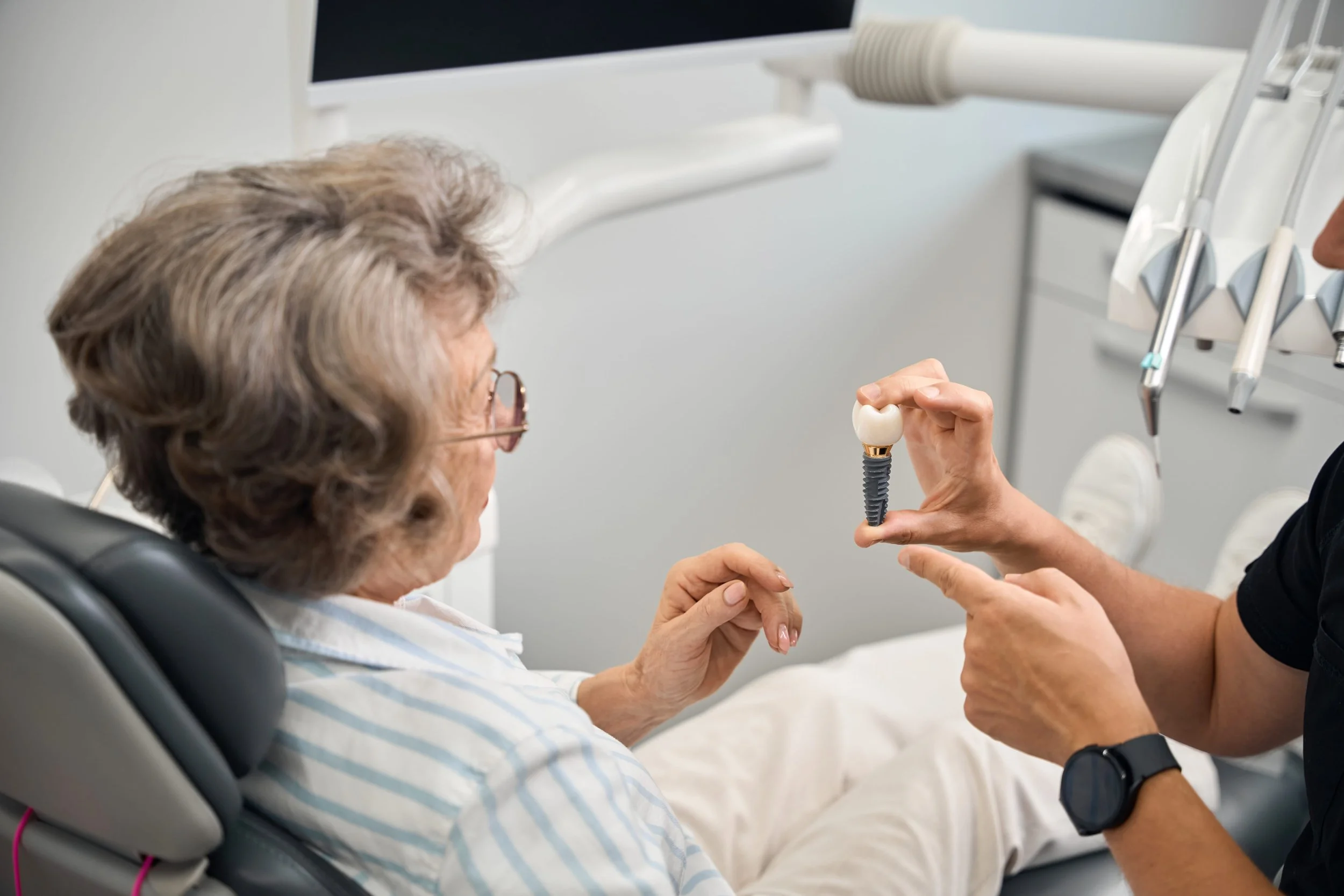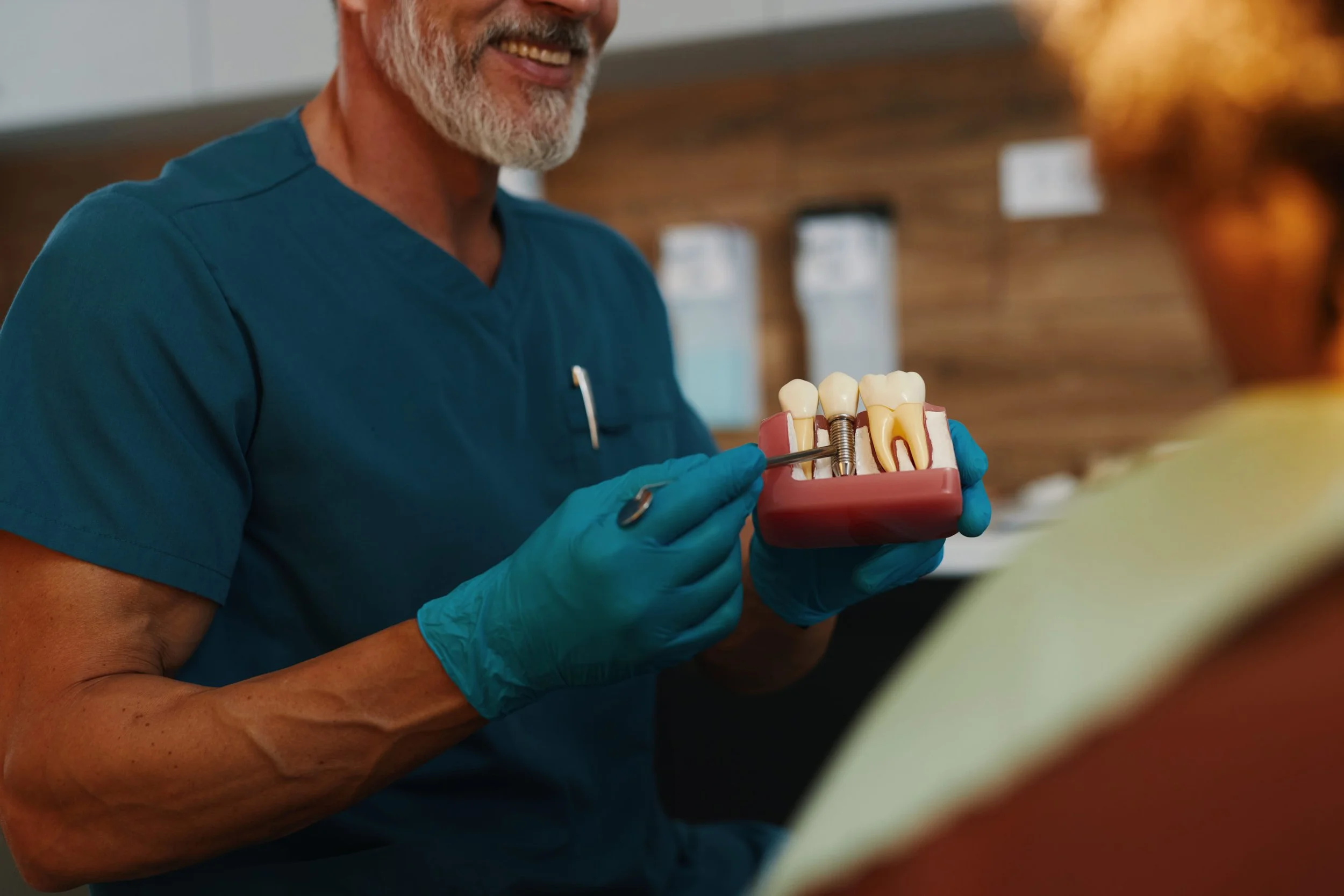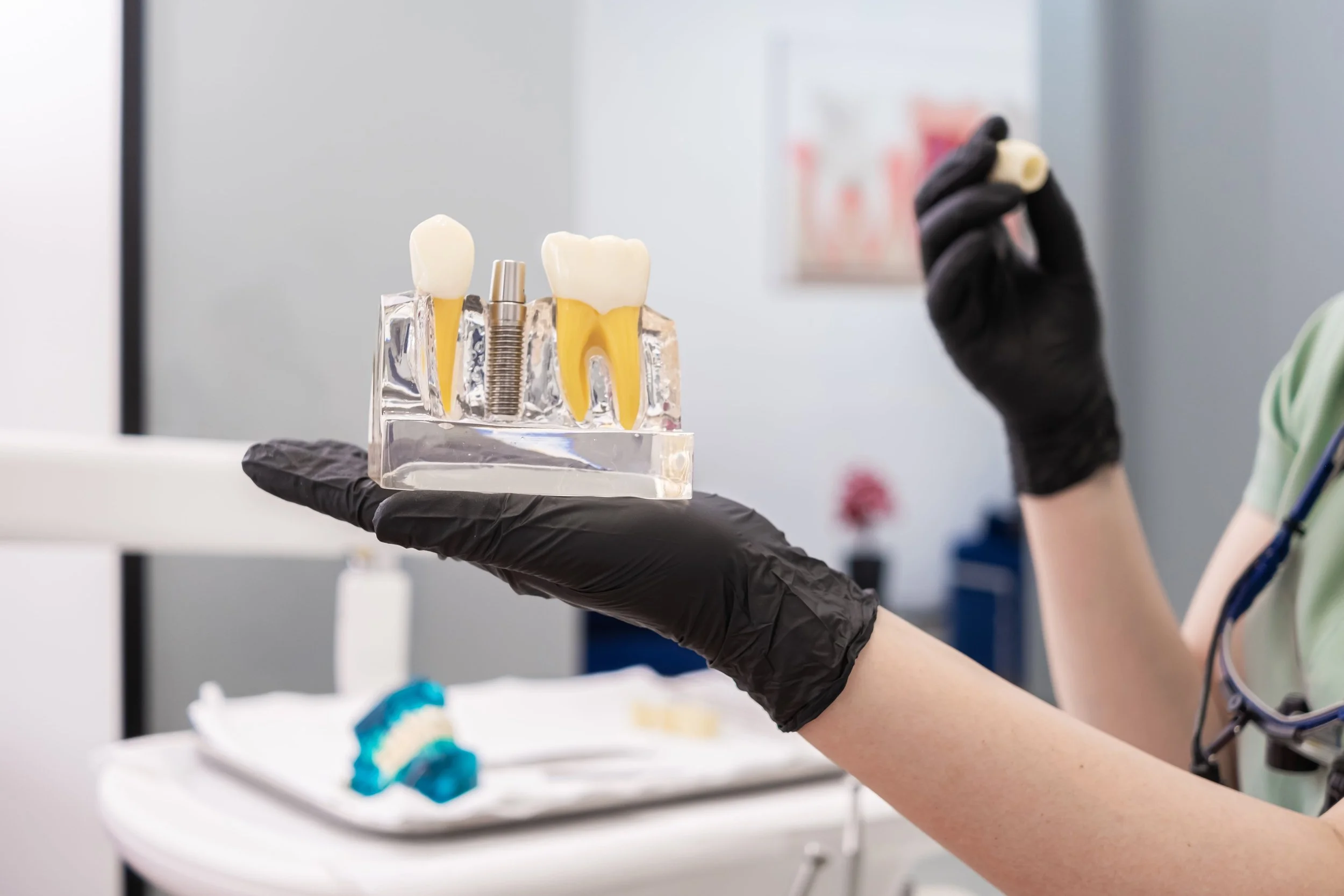Dental Implants
Key Highlights
Dental implants replace missing tooth roots
Designed to look, feel, and function like natural teeth
Treatment is planned carefully based on bone, bite, and oral health
Digital imaging supports precise planning and placement
Care is led by Dr. Angelique Freking and her Park Slope team
Missing teeth can affect how you chew, speak, and the balance of your bite. You may notice changes in comfort or function over time, even if the gap does not bother you right away.
When a tooth is missing, nearby teeth can begin to shift, and the jawbone in that area can gradually change. These changes can affect how your teeth fit together and make future treatment more complex.
Dental implants replace missing teeth by supporting a restoration at the root level. They are designed to restore function and appearance in a way that feels natural and stable.
When a Dental Implant Is the Right Option
One or more missing teeth
A tooth that cannot be saved and needs replacement
Difficulty chewing because of tooth loss
A preference to avoid removable dentures
Dental implants are used when replacing the tooth root provides better stability, function, and long-term support.
What a Dental Implant Does
A dental implant replaces the missing tooth root and creates a stable foundation inside the jaw. Instead of sitting on the gums or relying on nearby teeth, the implant supports the restoration from below.
Once the implant heals, it can hold a crown, bridge, or denture securely in place. By anchoring the restoration to the bone, the implant also helps maintain jawbone structure and prevent further changes in the area.
This support allows you to chew more comfortably and evenly, helping your bite feel balanced and natural again.
How We Plan Dental Implants at Park Slope Dentistry Seventh Avenue
Implant treatment starts with careful planning. At our Park Slope office, Dr. Angelique Freking and her team focus on understanding your oral health as a whole before recommending any procedure. Good outcomes depend on both the right technology and sound clinical judgment.
Comprehensive evaluation and digital imaging
We begin with a thorough exam, a review of your health history, and an evaluation of how your bite functions. This helps us understand not only where the tooth is missing, but how the surrounding teeth and jaw are working together.
We then use optical and radiographic 3D imaging to assess bone quality, anatomy, and spacing in the area where the implant may be placed. This level of detail allows us to plan implant positions carefully and identify any factors that may affect healing or stability.
All planning happens before any procedure begins. By using the same digital dental technology that supports our restorative care, we can recommend an approach that fits your anatomy, your bite, and your long-term comfort.
Precise placement with careful case selection
We plan implant placement based on bone quality, bite forces, and how the area will function long term. That planning guides where the implant goes and how it supports the final restoration.
Not every patient is an immediate candidate for an implant. Some people need additional healing time, and others may benefit from bone grafting before placement. We discuss these factors openly so expectations stay clear from the start.
Taking the right amount of time matters. By matching timing and technique to your anatomy, we help create a stable result that supports comfort and function for years to come.
Restoration designed for comfort and function
After placement, the implant integrates with the surrounding bone, creating a stable foundation for the final restoration. This process allows the implant to support chewing forces in a way that closely mimics a natural tooth.
Once healing is complete, we design the final crown to match your bite, shape, and appearance. Careful attention to these details helps the restoration feel comfortable when you chew and blend naturally with your surrounding teeth.
Throughout the process, we focus on function first. A restoration that works well within your bite supports long-term comfort, stability, and protects the surrounding teeth and jaw.
What to Expect During Dental Implant Treatment
Dental implant treatment happens over several visits. We guide you through each step so you know what’s happening and what comes next.
Step 1: Implant placement
After we complete planning, we numb the area and place the implant into the jawbone. The procedure focuses on precision and comfort; all patients go home the same day. Many report very little or no pain postoperatively.
Step 2: Healing and integration
Once placed, the implant needs time to heal and integrate with the bone. This step is essential and takes several months. During this time, we monitor healing and make sure the area stays healthy.
Step 3: Shaping the gums
After healing, we perform a very minor surgery where we place a small healing component that helps shape the gum tissue around the implant. This is called second-stage implant surgery and is critical in preparing the area for the final restoration.
Step 4: Final restoration
When healing is complete, we place the final crown or restoration. We adjust the bite and shape carefully so the implant feels comfortable and functions naturally with your other teeth.
Dental implant treatment is paced by healing. We move forward when the implant is stable and ready to support long-term function.
Dental Implants vs Bridges or Dentures
Dental implants, bridges, and dentures all replace missing teeth, but they do so in different ways.
Dental implants replace the tooth root and support a crown or restoration from within the jaw. This allows the replacement tooth to stand on its own without relying on nearby teeth.
Bridges replace a missing tooth by anchoring to the neighboring teeth on either side of the gap. Those teeth provide support for the restoration.
Dentures rest on the gums and are removable. Some dentures attach to remaining teeth or implants, while others rely on suction and fit.
Each option has a role. The right choice depends on your oral health, bite, bone structure, and personal preferences.
How Long Do Dental Implants Last
The longevity of a dental implant depends on several factors, including bone health, daily oral hygiene, and habits like teeth grinding. These factors affect how well the implant and surrounding tissues stay healthy over time.
Regular dental checkups allow us to monitor the implant, the restoration, and the supporting bone. Routine care helps identify changes early and supports long-term function.
Dental implants require ongoing care, just like natural teeth. Consistent brushing, flossing, and professional maintenance play an important role in keeping an implant stable and comfortable.
Why Choose Park Slope Dentistry Seventh Avenue for Dental Implants
Doctor-led implant planning
Our clinical team plans implant care based on your oral health, bite, and long-term stability. We take time to evaluate whether implants are appropriate and recommend them only when they support predictable function.
Digital precision with thoughtful case selection
We use digital imaging and planning tools to guide decisions, but we don’t default to technology for its own sake. Each case is evaluated individually to determine the safest and most effective approach.
Modern technology to benefit the patient
Advanced tools support accuracy and comfort during implant care. We use these tools to improve planning and execution, although occasionally we may choose a traditional method if it will offer a better outcome. We are always catering to your specific needs to give you the best possible outcome and experience.
Local, coordinated care in Park Slope
From evaluation through restoration, care is coordinated by a consistent local team. This continuity helps ensure clear communication, careful follow-up, and treatment that stays focused on long-term comfort and function.
Let’s Talk About Whether Dental Implants Are the Right Choice
If you’re missing a tooth or considering options for replacement, a conversation can help clarify what makes sense for your situation. We’ll start with an evaluation, review what we see, and talk through whether dental implants are an appropriate option based on your oral health and long-term goals.
If you’d like to move forward, you can book online, or you’re welcome to call 718-866-4645 to speak with our Park Slope team and set up a visit.
Dental Implant FAQs
-
We use local anesthesia during implant placement to keep you comfortable and pain-free during your surgery. Implant surgery is often very well tolerated. Most patients report mild soreness afterward, which typically improves within a few days and can be managed with over-the-counter pain relief medication like ibuprofen and/or acetaminophen.
-
The overall timeline varies. Placement happens in one visit, but healing and integration take several months before the final restoration is placed. We plan timing based on how your body heals, not a fixed schedule.
-
Adequate bone is important for implant stability. If bone loss has occurred, additional healing time or bone grafting may be needed. We evaluate this during your exam and imaging.
-
Care is similar to natural teeth. Daily brushing, flossing, and regular dental checkups help keep the implant and surrounding tissues healthy.



